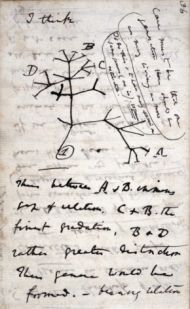George contra Darwin: Human Nature and Evolution
Simon McKenna
In Progress and Poverty, George refutes Darwin’s contention that social improvements are physically transmitted through the generations of mankind. Although Darwin was not aware of DNA as such, he foresaw the discovery of such a mechanism, which he called Pangenesis. Darwin argued that developments evident in mankind, such as ethical codes and language, are physically inherited through sexual selection in the same way as morphological characteristics such as hair colour or athletic ability.
George, on the contrary, showed that genetic inheritance is not the primary vehicle of evolutionary improvement in man. While physical adaptations have been passed on, developments of a personal, social and intellectual nature have been lost. Human history, namely the rise and fall of civilisations, is testament to this. All we can do to understand the lives and thought of the great civilisation of ancient Egypt, for example, is to deduce it from what remains of their civilisation, the tombs and the writings. We have to guess. Indeed, until the discovery of the Rosetta Stone, we could not even decode their writing. Now, even though we can decode some of their writings, much of the Egyptian meaning of life is still incomprehensible to us.
Yet, despite these flaws in Darwin’s theory, many of the notions that he popularised have become accepted as ‘true,’ especially the notion that human life, practically speaking, is identical to animal life: we are animals, just smarter. Perhaps this is why George, in Social Problems, returns to rewrite the story of evolution and re-evaluate human nature.
Darwin had said the difference between man and animals is of ‘degree and not kind’. For him, the fact that his dog twitches in its sleep is sufficient evidence to say that dogs have dreams and therefore imaginations like ours. Our dreams, and our imaginations, are only human versions of what a dog imagines or dreams. A dog’s consciousness is roughly equivalent to a man’s. Likewise, a dog barks, so a man’s language is simply a more advanced version of barking. Darwin contends that as we have better memories, we are able reckon more accurately from cause to effect. These abilities are what gives rise to our ‘social instinct’.
imagines or dreams. A dog’s consciousness is roughly equivalent to a man’s. Likewise, a dog barks, so a man’s language is simply a more advanced version of barking. Darwin contends that as we have better memories, we are able reckon more accurately from cause to effect. These abilities are what gives rise to our ‘social instinct’.
Morality is a function of social instinct, which in itself is merely a function of sexual selection. Our intellect is then the means by which we procure advantage in the competition for the future of our families and of our race. Just as the male peacock competes for the attention of potential mates by displaying his plumage and a female might signal her fertility through scents and calls, humans compete against one another to attract sexual partners. The only difference is that for humans, endowed with social instinct, competition occurs through displays of good manners and conspicuous consumption, as much as through displays of physical suitability.
Darwin was reluctantly aware that his theory of sexual selection had massive ethical implications for the organisation of society. But it was not a responsibility he seemed very keen on accepting. He admitted only that ‘the advancement of mankind is a most intricate problem’. He protested that he was a scientist, concerned only with objectivity, not with ‘hopes and fears’.
There were several problems he seems unable to solve. Firstly, the problem of the poor. If Darwin was right, the rich and successful should succeed over the poor. However, he had to admit, that there were, by sheer weight of numbers, far more of the poor than the wealthy. He said that the poor should be discouraged from marrying. Secondly, he also had to advocate a society where there were no restrictions in the competition for wealth because this had become the way that humans would decide on the future of the race. There should therefore be nothing holding the strongest back from securing their natural advantage. Thus, he advocated an unregulated, laissez-faire, society where hereditary wealth should be banned. This would mean that economic advantage would not be inextricably linked to genetic inheritance. Yet genetic inheritance should be passed on by the most successful.
Darwin cannot answer many questions which should have begun to unravel his theory of sexual selection. Why do richer people have fewer babies? Why does the concentration of wealth lead to a narrowing of biological selection, while these people are also the most influential? They have no offspring, yet their books may change the course of history, their declarations of war might destroy entire generations, or their discoveries might save mankind from the most terrible of diseases.
Furthermore, Darwin recognised these ‘great men’ usually have the benefit of inherited fortunes. If it were not for the inherited wealth they would not be able to make discoveries or educate people about things that are important for the whole species. Darwin, would, of course, have to include himself among these great men. Darwin himself eventually has to concede that he hopes the victorious classes will become better people. But there seems, based on his account of the realities of life, to be very little reason for them to be so, especially if each generation has to fight again for the wealth their fathers earned.
We are left with a situation where a struggle for advantage, by any means, social or economic, condemns the poor to failure and death simply because they lack the advantage secured by the healthy and wealthy; the so-called ‘war of all against all.’ Ethically speaking, life becomes a race to the lowest common denominator. Even if unpalatable, today this view of life (the ‘rat race’) is, perhaps, accepted as common-sense reality.
For George both this misconception of man and its implications create a society where ‘greed and lust’ are the guiding principles. The difference between humans and animals should be distinct and profound enough to invalidate the prevailing Darwinian depiction of the nature of life. All life is intelligent and with man, consciousness develops a new aspect: self-consciousness.
“In man,…the intelligence which increases all through nature’s rising scale passes at one bound into an intelligence so superior, that the difference seems of kind rather than degree” (Social Problems Chapter 1).
Using Darwin’s own words, George formalises his opposition to the idea that sexual selection might be the chief means of the progress of humanity. He dismisses it as an ‘ethics of savagery’.
George is not known as an evolutionary scientist or a student of human nature. Yet his conception of human nature arguably informs all his work. Political Economy was merely the means by which he saw how our true human nature could realise its full potential. Human nature is not an anomaly nor an insignificant event in the whole history of life. It is what joins humanity to the natural laws which govern the natural and human world.
George’s vision of evolution and human nature has much in common with the vision Teilhard de Chardin has of evolution. He joins George against Darwin’s materialist conception of human nature and evolution. Teilhard provides us with a thorough exposition of the methodology of the scientific investigation of man which entirely supports George’s outline described in Social Problems.
Teilhard argues that evolutionary theorists like Darwin have been misled by an inadequate approach to the study of life. The positivist conception of objectivity limits the phenomena which can be admitted to the realm of scientific observation. Positivist science, as popularised by naturalists like Darwin, excludes precisely the phenomena which makes man unique and yet linked to the rest of nature.
In the eyes of the physicist, nothing exists legitimately, at least up to now, except the without of things. The same intellectual attitude is still permissible in the bacteriologist studying the behaviour of plants. It tends to become a gamble in the case of a biologist studying the behaviour of insects or coelenterates. It seems merely futile with regard to the vertebrates. Finally, it breaks down completely with man, in whom the existence of a within can no longer be evaded, because it is the object of a direct intuition and the substance of all knowledge. (The Phenomenon of Man)
The phenomenon of reflection is the latest manifestation of the evolutionary progress of life. Yet it is this dimension which has been passed over by scientists. This dimension is the ‘inner face’ of matter. It is the animating intelligence or energy present in all life. It becomes increasingly apparent in the higher levels of life. With man it is finally unavoidable, as we are by nature aware of this inner dimension within ourselves. Man is therefore unique precisely because of his ability to self-consciously reflect.
Teilhard also replies to Darwin, as George did, in his own words. Humans are paradigmatically different from animals because we are reflective, self-conscious beings:
“We are separated by a chasm – or a threshold – which [animals] cannot cross. Because we are reflective we are not only different but quite other. It is not merely a matter of change of degree, but of change of nature, resulting of change in state.” (The Phenomenon of Man).
For Teilhard, evolution is not only characterised by the slow progression of natural selection but also by sudden changes of states. While George only describes the step from animal consciousness to self-consciousness which gives rise to the social dimension, there have been other very important instances where life on earth has suddenly achieved greater levels of complexity. These transformations are analogous to others in nature. Water, for example, when sufficiently heated, suddenly turns from a liquid into a gas. Such paradigmatic changes have occurred at specific points in the evolution of life, as when the units of chemical life crossed a chasmic threshold of increased complexity with the evolution of multicellular organisms from life from bacteria; when the development of photosynthesis enabled cells to create energy; or, when man evolved from apes.
With each new paradigm of life, with each threshold crossed, life becomes more complex and more dependent on the all other forms of life. Each threshold is a revolutionary advance. For Teilhard these levels of life form distinct layers around the earth: the layers of organic innate matter ‘geosphere’; organic life ‘biosphere’, and the social, thinking level of life, the ‘noosphere.’ Self-reflection corresponds to the change in state George referred to which gives birth to the ‘social dimension’. Each layer is increasingly vital, both morphologically and psychically.
These changes of state are evident in the history and evolution of mankind, not to any other species. In these changes, we see the inner power of nature unleashed more radically than ever before. As when Homo-sapiens man first settled into communities and established the division of labour which led to the Neolithic Revolution. This co-operation enabled a fantastic unleashing of human creative power which gave birth to the first civilisations. From then until now, all the developments of mankind have been in the ‘social dimension’ and have not been recorded in any biological improvements in man. They have been made evident in the cultures he has created.
It is the phenomenon of reflection that makes humans different from animals. Reflection makes possible the whole dimension of thought: “‘another world’ is born of Abstraction, logic, reasoned choice and invention, mathematics, art, the calculation of space and time, anxieties and dreams of love – all these activities of inner life” (The Phenomenon of Man). This is the realm of nature that is uniquely human.
Thus George argued that human society should be organised so that it ensured the cultivation of intellectual and moral powers, increasing knowledge and widening thought, destroying prejudice. Those who were able should devote themselves to the uplifting of others, not acting on self-interest, but according to “duty and sympathy” (Social Problems).
The social dimension is what makes us most human. This is why George insists that the abolition of private monopolies of natural resources and labour will not be enough to save our civilization from destruction. Mere “fiscal reform” is not enough because without proper understanding of what makes us human, all reform will fall prey to exploitation by private interests. “I am firmly convinced” writes George, “as I have already said, that to effect any great social improvement, it is sympathy rather than self-interest, the sense of duty rather than the desire for self-advancement, that must be appealed to”. (Social Problems Chapter 22)
Image attribution ‘Darwin Tree’ Charles Darwin, Public domain, via Wikimedia Commons




